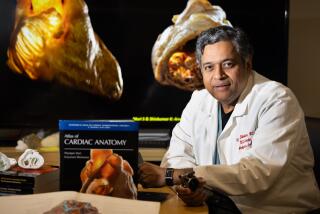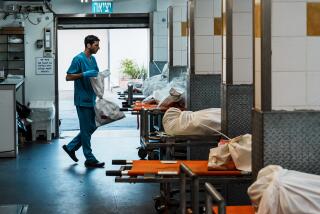Trip to Aid Chernobyl Victims Transcended Politics, Israeli Says
- Share via
When UCLA doctor Robert P. Gale asked Israeli biophysicist Yair Reisner to join a four-member medical rescue mission to treat Soviet victims of the May Chernobyl nuclear reactor accident, he agreed immediately to go to Moscow.
Only after Reisner realized he would be the first Israeli citizen to go to the Soviet Union in almost 20 years did he develop apprehensions.
“I wanted to go but, politically, as you know, we (Israel) have a lot of problems with the Soviets (on emigration) of Russian Jews,” Reisner, 37, said in a weekend interview in San Diego, where he spoke to a Jewish group. At the time that Gale called, Reisner was visiting at Memorial Sloan-Kettering Cancer Center in New York, where he previously had studied on a scientific exchange from the Weizmann Institute in Israel.
“I called the Israeli Embassy, and lots of cables I guess went back and forth to the Israeli government,” Reisner said. “They said to go ahead, that perhaps some good will would come out of this. There really was no negative side to going.”
Nevertheless, Reisner told Gale that he wanted the UCLA bone marrow expert to meet him at the plane in Moscow or he would not leave the aircraft. Since the 1967 Six-Day war between Israel and Egypt, Israel and the Soviet Union have had no diplomatic relations, and Israeli citizens normally cannot receive Russian visas.
“What I was doing would have been absolutely impossible under normal conditions,” Reisner said. “Russia is not the most pleasant place to arrive without a visa--even perhaps with a visa.”
But as an indication of how much the Soviets wanted Reisner’s expertise, the director of the Soviet Ministry of Health was waiting along with Gale when Reisner landed, smoothing procedures with police and customs officials. And Reisner received the same diplomatic treatment as the three American specialists from UCLA during the 10 days the team labored in Moscow to save radiation victims from Chernobyl, the world’s worst nuclear power accident.
Reisner taught Soviet doctors the technique he pioneered both at Weizmann and at Sloan-Kettering to prevent rejection of bone marrow--a critical component of the body’s immune system--during marrow transplants. High radiation doses destroy bone marrow, and the medical team in Moscow was attempting to restore the immune systems of Chernobyl victims. (The technique is also used to provide immune systems to so-called “bubble children” born without natural disease protection. The first transplants on the children took place at Sloan-Kettering, largely as a result of Reisner’s work.)
Through conversations and a hospital lecture he gave, Reisner found that the Soviet doctors he worked with had copies of all his scientific papers and were aware of the level of bone-marrow research in the non-Communist world. The Soviets clearly lacked the expertise and equipment to treat the radiation victims, Reisner said, noting that the low state of preparedness belies fears occasionally expressed by Western experts that the Soviets are prepared to fight and win a nuclear war.
Reisner said the Chernobyl accident, which forced the evacuation of hundreds of thousands of residents near the major Soviet city of Kiev, points out the futility of devising medical treatment for nuclear war victims, no matter what level of medical sophistication is available, either in the Soviet Union or the United States.
“After all, given all the expertise available and the half-million dollars in equipment we flew (to Moscow), we saved probably five people,” Reisner said. “Twenty-eight died despite transplants because the immunological problem is just one among many--burns, poisoning--resulting from radiation. Bone marrow transplants can’t deal with those.
“It simply reflects our limitations to deal with such problems. And Chernobyl was a minor accident.”
Because of the haste in which Reisner left for Moscow, he had no time to consult with his government on relaying any messages to Soviet officials on its behalf. Reisner thought that perhaps some Jewish dissidents might attempt to contact him in Moscow, but, as far as he knows, none tried.
Reisner did have spirited conversations, however, with escorts from the Health Ministry, who stayed with the medical team almost constantly, serving as translators, schedule arrangers and intermediaries.
“We had quite broad discussions about East vs. West, about capitalism and communism, but very little about specifics of medicine, since it is very apparent (without talking) that they know how far behind they are,” Reisner said.
When he brought up the question of Jewish emigration (the Soviets have largely refused to allow Jews to emigrate), Reisner received contradictory answers.
“First, I was told that the (3 million) Jews don’t want to leave,” Reisner said. “Then I was told that there are so many scientists among the Jews, so how can they let them go?”
At his insistence, both at a formal dinner for the medical team and at a Moscow press conference, Reisner was introduced as an Israeli faculty member from the Weizmann Institute. But he said that copies of Pravda reporting the work of the doctors never mentioned his Israeli connection.
“The stories always said, ‘Three Americans and Dr. Yair Reisner,’ ” he said.
Reisner smiles when asked about Western media coverage of the medical assistance, indicating that he would like to see it “quiet down.”
“After all, medically we did not learn many new insights in terms of radiation problems,” Reisner said. “Perhaps down the line, in two years or later, we will learn of new cancers, but I can’t think of any breakthrough that came out of the work now. We do need to learn more about how to accurately estimate radiation doses that may be received during accidents, and we need to do tissue typing of nuclear plant workers ahead of time so that they can be treated (possibly with bone marrow transplants) more quickly if an accident does happen.”
As for political benefits to Israeli-Soviet relations, Reisner is neither optimistic nor downcast.
“I hoped my going there might help some Jewish people to benefit in the end (by being allowed to emigrate) and that still remains to be seen,” he said. “We have some test cases there that we know about, but there is no sign yet.”
More to Read
Sign up for Essential California
The most important California stories and recommendations in your inbox every morning.
You may occasionally receive promotional content from the Los Angeles Times.









